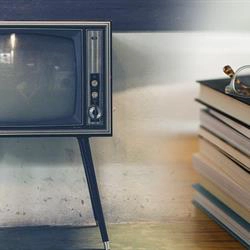
I really didn’t start reading obsessively, deeply, intensely, the way I do now, until I was ten which was about the same time that I started watching Doctor Who with the same enthusiasm. The joy of discovering the series was compounded with the agony of realising I’d missed ten years of TV episodes which were rarely repeated and some of the recordings had even been destroyed, but luckily the saving grace which made me deliriously happy, was that all old episodes were being made into Target novelisations and it became my childhood goal to collect and read them all.
And I did. I also came to realise that I enjoyed the books a lot more than the television shows, when I eventually caught up with them on video and cable TV. The poor special effects and, at times, terrible acting have a camp, over the top, appeal, but they often didn’t do justice to the amazing worlds and characters created in the books. This made me understand at an early age, that having access to books was like having a TARDIS, and that they could take you anywhere in the universe and allow you to experience everything that ever happened, or ever will.
"I discovered when young that reading is a highly addictive experience - in a good way - and is linked with growth and the development of intelligence. Reading makes us ask questions and create links; quite often in our reading, we detect echoes of other books and authors who we then want to discover for ourselves."
Books can take us to other worlds while at the same time creating for us a deeper sense of the connection to the world around us. One of the paradoxes of reading is that there is usually a lot more to it than we first suppose. Like a TARDIS, a good book is a lot bigger on the inside, the inside in this case being the inside of our minds, that the book somehow expands into. A great book can change the way you think and feel about the world in a way that may not be apparent to anyone but you. A good book can make you feel less alone; reading is a solitary activity but, when you do it well, it makes you feel connected to others.

Reading a good book also connects you to other books, and one book does usually, literally, lead to another. The best writers tend to be great readers themselves, and carry with them traces of some of the hundreds, if not thousands, of books that they have read before attempting to write the one at hand. I discovered, when young, that reading is a highly addictive experience - in a good way - and is linked with growth and the development of intelligence. Reading makes us ask questions, and create links. Quite often in our reading, we detect echoes of other books, and authors who we then want to discover for ourselves. Developments in neuroscience have shown that activities like reading create new neural pathways in the brain, and this is the biological basis of how, what seems like a passive activity, can deeply change the way we think and feel about ourselves and our world.
My own first direct experience happened at the same time that I began my Doctor Who obsession, aged about ten, when I read Elidor by Alan Garner. This was the first book I ever read that was set in a world that was very real to me and evoked the Manchester of my early childhood. Terraced houses and cobbled streets that were slowly being cleared and demolished, an adventure playground that was changing and exciting while also being menacing and threatening. In the book a group of children discover that everyday objects become portals to another, magical world (which also contains elements of danger, threat and menace) and the magic of the book is that it tells us that the two worlds exist side by side and are almost mirror images of one another.
I loved this idea, that there are worlds within worlds and that everything is connected and it has become a sustaining belief throughout my life. It’s been fascinating to witness seeing this idea surface time and time again, in different forms and permutations. in other books and films like Phillip Pullman’s His Dark Materials trilogy and the Christopher Nolan film Interstellar. The best books are like human minds, simultaneously containing spatial boundaries but seemingly limitless in other respects. The more we look into such books the more we discover about other books, other ideas, other times, other people, and ultimately more about ourselves.






Share Article